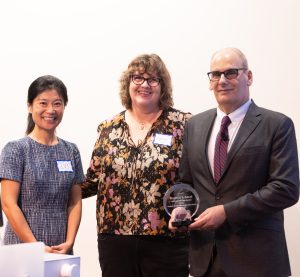Monday, November 4, 2024
By: Jori Rzepecki

At the annual Ernest R. Bartley Memorial Lecture, George Washington University’s Randall Abate warned that current United States laws are inadequate to address the growing crisis of climate-related displacement, highlighting vulnerable communities in Florida and Alaska as prime examples.
The Bartley Lecture Series, hosted by the University of Florida’s Department of Urban and Regional Planning, honors the legacy of Ernest R. Bartley, a distinguished professor who made significant contributions to urban planning and law. The 2024 lecture focused on climate resilience and adaptation.
Speaking to a packed room at the Harn Museum of Art, Abate discussed the concept of “coastal migration with dignity,” examining how legal frameworks can better protect communities forced to relocate due to climate change.
The lecture highlighted two distinct types of climate displacement: “receding communities” along Florida’s coast and “displaced communities” in Native Alaskan villages. In Florida, the phenomenon of “climate gentrification” is forcing inland communities from areas like Little Haiti to relocate as wealthy coastal residents move to higher ground. In Alaska, Native communities like Kivalina face imminent displacement due to rising seas and coastal erosion.
Global projections suggest 1.2 billion people could face climate-related displacement by 2050, yet there remains no comprehensive legal framework to address this crisis. Abate noted this figure is 20 times higher than the current number of refugees under UN jurisdiction.
The lecture outlined several potential solutions, including community land trusts and benefit agreements in Florida to preserve affordable housing, and called for reforms to FEMA to address “slow-onset” disasters rather than just immediate catastrophes.
Current federal legislation addressing climate migration focuses primarily on international displacement while largely ignoring domestic displacement issues. Abate advocated for a more proactive approach, particularly in supporting Native Alaskan communities who have already filed human rights petitions against the U.S. government for lack of assistance.
“The goal is to make this less bad,” Abate said. “We’re not going to fix it. This is a problem much larger than what our legal tools can correct, but we have options to limit the impact.”
The lecture concluded with a call for urgent legal reform at federal, state, and local levels to protect vulnerable communities facing climate displacement, carrying forward Ernest Bartley’s legacy of using law and planning to address critical societal challenges.
